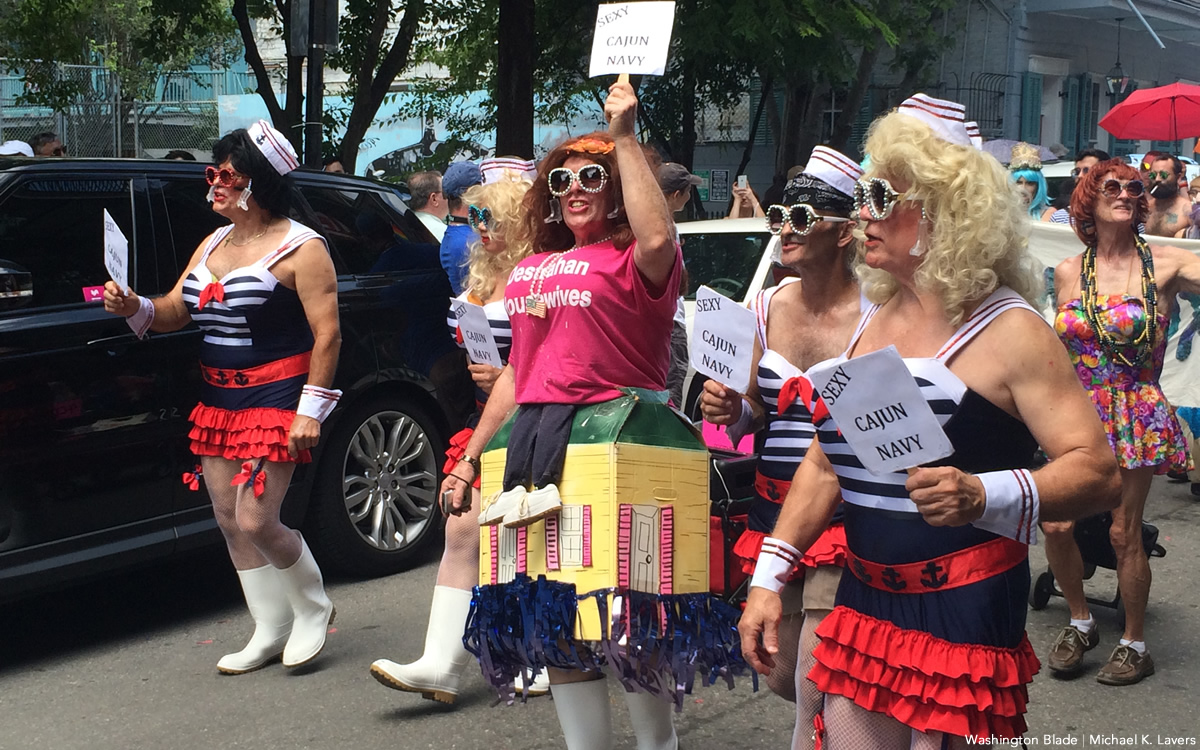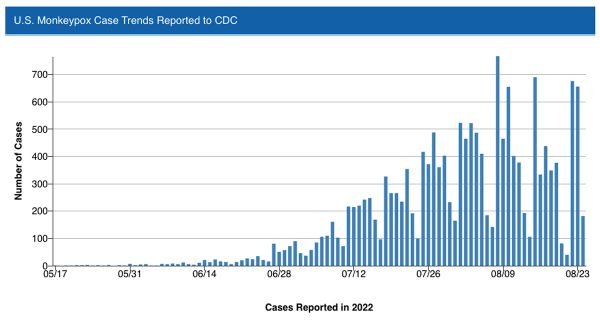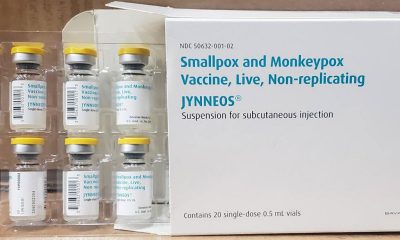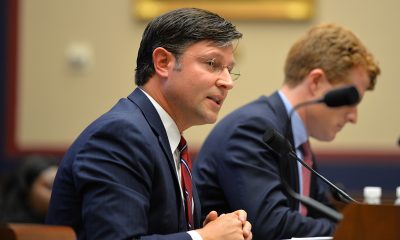National
U.S. health officials expand approach to monkeypox vaccines as cases crest

At the end of a summer when the number of cases in the monkeypox outbreak rose sharply, the increase in reported infections now appears to be cresting amid increased public messaging and access to vaccines, prompting U.S. health officials to expand their strategy with a new equity-based effort to combat the disease.
Although the reported number of cases, according to most data from the Centers for Disease Control & Prevention, has reached 18,417 in the United States, the number of additional cases decreased from the high at the start of the month, suggesting a downward trajectory in the spread of the disease as vaccines become more readily available.

The numbers are also consistent with a new study finding a significant number of gay and bisexual men, as well as other men who have sex with men, have been limiting contact with casual sex partners, which has been the driving force in the spread of monkeypox. The report from the CDC last week found limiting one-time sexual encounters can significantly reduce the transmission of monkeypox virus, while about half of men who have sex with men are cutting down on sexual activity amid the outbreak, including one-night stands and app hookups.
With the trajectory of monkeypox on the decline, the Biden administration announced a new initiative with the goal of ensuring vaccine distribution is consistent with the value of equity, including on the basis of geographic, racial, and ethnic lines. A total of 10,000 doses of vaccines in the federal government’s supply will be earmarked for localities that have used 50 percent of their allocated supply to support equity interventions, such as outreach to Black and Latino communities, which have been disproportionately affected by the disease or a specific event and celebration for LGBTQ people, health officials announced Tuesday.
Demetre Daskalakis, the Biden administration’s face of LGBTQ outreach for monkeypox and deputy coordinator for the White House monkeypox task force, laid out the details for the new equity-based supplementary initiative in a conference call Tuesday with reporters.
“So what we mean by an equity intervention is what works in your state, county, or city to reach people who we may not be reaching, especially people of color and members of the LGBTQI+ population,” Daskalakis said. “What it means is: It can be working with a specific group or venue that reaches the right people for monkeypox prevention. Once these innovative strategies have been reviewed by CDC, vaccines will be supplied to jumpstart these ideas and accelerate reach deeper into communities.”
The additional equity-based approach to monkeypox vaccine distribution is consistent with the Biden administration’s efforts in recent weeks to distribute additional shots to localities hosting large-scale events for LGTBQ people at the end of the summer, such as Black Pride in Atlanta and Southern Decadence in New Orleans.
Louisiana Gov. John Bel Edwards joined the conference call with reporters on Tuesday and had high praise for the Biden administration for making the additional 6,000 doses of monkeypox vaccine available in time for Southern Decadence, which takes place in the final week of August through Labor Day weekend.
“This is an example — I think a really solid example — of what a federal-state-local partnership and — and then the community providers as well,” Bel Edwards said. “Because the public health folks in New Orleans have been tremendous, but also the community providers.”
Bel Edwards said health officials in the Biden administration have, in addition to providing more vaccines, sent down multidisciplinary teams to New Orleans to help the state organize and prepare as well as set up testing and vaccination sites “that are going to be convenient for the at-risk population.”
A reporter from the New Orleans Advocate on the conference call, however, asked a pointed question on the recent distribution of vaccines to New Orleans in advance of Southern Decadence: The current approach to vaccine administration requires a series of shots, and even with new distribution most people won’t have even had their second shot by that time, so how can Southern Decadence think they will be protected, especially when vaccines take time to become fully effective?
Daskalakis, while promoting the equity-based approach to vaccine distribution, said the Biden administration has been “very clear” that first shot of the monkeypox vaccine “doesn’t mean that you’re protected for the event.”
“We’re going to talk to them about lots of other strategies that they can reduce risk of acquiring monkeypox, but also make it clear that that shot is not for today; it’s for four weeks from now, plus two weeks after that second dose when you get maximum protection,” Daskalakis said.
First death of monkeypox patient reported
Although the number of cases is cresting, concern about monkeypox continues as well as the potential danger of the disease. Case in point: The death of a hospital patient in Texas who had monkeypox, but may have to succumbed to other factors, has drawn attention amid a conventional understanding the skin disease isn’t fatal. The case represents the first time in the United States that a patient with monkeypox died while having the condition.
The patient, as confirmed by the Texas Department of State Health Services on Tuesday, was an adult resident of Harris County who was “severely immunocompromised” and state health officials reviewing the case said it is under investigation to determine what role monkeypox played in the death.
Jenny McQuiston, a CDC official who specializes in research on zoological diseases that spread from animals to people, said in response to a question on the casualty that health officials are also evaluating the death and the role monkeypox played.
“I think it’s important to emphasize that deaths due to monkeypox, while possible, remain very rare,” McQuiston said. “In most cases, people are experiencing infection that resolves over time. And there have been very few deaths even recorded globally. Out of over 40,000 cases around the world, only a handful of fatalities have been reported.”
Despite the cresting in the number of cases, many health experts aren’t sold on the new approach to vaccines announced earlier this month by the Biden administration, which sought to expand existing doses of vaccines fivefold as supply hasn’t met demand. The new vaccine approach calls for injecting the JYNNEOS vaccine from the subcutaneous route (delivery of the vaccine under the fat layer underneath the skin) to the intradermal route (delivery of the vaccine into the layer of skin just underneath the top layer).
Bob Fenton, a regional administrator for FEMA and the response coordinator for the White House task force, said about 75 percent of jurisdictions have already adopted the new approach to vaccine injection, while an additional 20 percent are working toward a “fully operational intradermal method.”
“We continue to be laser-focused on doing everything within our power to help jurisdictions and clinicians get shots in arms,” Fenton said. “We’re seeing more and more jurisdictions adopt the intradermal administration.”
Data of this new intradermal approach, critics have said, is insufficient to support the idea it will be as effective as subcutaneous injections, although the Biden administration continues to give assurances the new route for injections is tested and safe. According to a report earlier this month in the Washington Post, the manufacturer of the JYNNEOS vaccine in Denmark, Bavaria Nordic, privately threatened to cut off supply of the shots based on a conversation with health officials on objections the vaccine hasn’t been approved for intradermal use.
McQuiston, in response to a question on whether or not U.S. health officials are collecting newly available real-world information on the results of the new vaccine approach, said U.S. health officials continue to receive data on monkeypox and soon onboard information from additional states.
“CDC operates a system called VAERS — or the Vaccine Adverse Event Reporting System — and we’re actively looking at…different types of events that might be reported post-vaccination,” McQuiston said. ” And we are actively gathering information from the different jurisdictions and states and cities about which vaccines they’re administering — whether it’s subcutaneous or intradermal — and we are gathering those data now, as we speak.”
U.S. Supreme Court
Supreme Court to consider bans on trans athletes in school sports
27 states have passed laws limiting participation in athletics programs

The U.S. Supreme Court on Thursday agreed to hear two cases involving transgender youth challenging bans prohibiting them from participating in school sports.
In Little v. Hecox, plaintiffs represented by the ACLU, Legal Voice, and the law firm Cooley are challenging Idaho’s 2020 ban, which requires sex testing to adjudicate questions of an athlete’s eligibility.
The 9th U.S. Circuit Court of Appeals described the process in a 2023 decision halting the policy’s enforcement pending an outcome in the litigation. The “sex dispute verification process, whereby any individual can ‘dispute’ the sex of any female student athlete in the state of Idaho,” the court wrote, would “require her to undergo intrusive medical procedures to verify her sex, including gynecological exams.”
In West Virginia v. B.P.J., Lambda Legal, the ACLU, the ACLU of West Virginia, and Cooley are representing a trans middle school student challenging the Mountain State’s 2021 ban on trans athletes.
The plaintiff was participating in cross country when the law was passed, taking puberty blockers that would have significantly reduced the chances that she could have a physiological advantage over cisgender peers.
“Like any other educational program, school athletic programs should be accessible for everyone regardless of their sex or transgender status,” said Joshua Block, senior counsel for the ACLU’s LGBTQ and HIV Project. “Trans kids play sports for the same reasons their peers do — to learn perseverance, dedication, teamwork, and to simply have fun with their friends,” Block said.
He added, “Categorically excluding kids from school sports just because they are transgender will only make our schools less safe and more hurtful places for all youth. We believe the lower courts were right to block these discriminatory laws, and we will continue to defend the freedom of all kids to play.”
“Our client just wants to play sports with her friends and peers,” said Lambda Legal Senior Counsel Tara Borelli. “Everyone understands the value of participating in team athletics, for fitness, leadership, socialization, and myriad other benefits.”
Borelli continued, “The U.S. Court of Appeals for the Fourth Circuit last April issued a thoughtful and thorough ruling allowing B.P.J. to continue participating in track events. That well-reasoned decision should stand the test of time, and we stand ready to defend it.”
Shortly after taking control of both legislative chambers, Republican members of Congress tried — unsuccessfully — to pass a national ban like those now enforced in 27 states since 2020.
Federal Government
UPenn erases Lia Thomas’s records as part of settlement with White House
University agreed to ban trans women from women’s sports teams

In a settlement with the Trump-Vance administration announced on Tuesday, the University of Pennsylvania will ban transgender athletes from competing and erase swimming records set by transgender former student Lia Thomas.
The U.S. Department of Education’s Office for Civil Rights found the university in violation of Title IX, the federal rights law barring sex based discrimination in educational institutions, by “permitting males to compete in women’s intercollegiate athletics and to occupy women-only intimate facilities.”
The statement issued by University of Pennsylvania President J. Larry Jameson highlighted how the law’s interpretation was changed substantially under President Donald Trump’s second term.
“The Department of Education OCR investigated the participation of one transgender athlete on the women’s swimming team three years ago, during the 2021-2022 swim season,” he wrote. “At that time, Penn was in compliance with NCAA eligibility rules and Title IX as then interpreted.”
Jameson continued, “Penn has always followed — and continues to follow — Title IX and the applicable policy of the NCAA regarding transgender athletes. NCAA eligibility rules changed in February 2025 with Executive Orders 14168 and 14201 and Penn will continue to adhere to these new rules.”
Writing that “we acknowledge that some student-athletes were disadvantaged by these rules” in place while Thomas was allowed to compete, the university president added, “We recognize this and will apologize to those who experienced a competitive disadvantage or experienced anxiety because of the policies in effect at the time.”
“Today’s resolution agreement with UPenn is yet another example of the Trump effect in action,” Education Secretary Linda McMahon said in a statement. “Thanks to the leadership of President Trump, UPenn has agreed both to apologize for its past Title IX violations and to ensure that women’s sports are protected at the university for future generations of female athletes.”
Under former President Joe Biden, the department’s Office of Civil Rights sought to protect against anti-LGBTQ discrimination in education, bringing investigations and enforcement actions in cases where school officials might, for example, require trans students to use restrooms and facilities consistent with their birth sex or fail to respond to peer harassment over their gender identity.
Much of the legal reasoning behind the Biden-Harris administration’s positions extended from the 2020 U.S. Supreme Court case Bostock v. Clayton County, which found that sex-based discrimination includes that which is based on sexual orientation or gender identity under Title VII rules covering employment practices.
The Trump-Vance administration last week put the state of California on notice that its trans athlete policies were, or once were, in violation of Title IX, which comes amid the ongoing battle with Maine over the same issue.
New York
Two teens shot steps from Stonewall Inn after NYC Pride parade
One of the victims remains in critical condition

On Sunday night, following the annual NYC Pride March, two girls were shot in Sheridan Square, feet away from the historic Stonewall Inn.
According to an NYPD report, the two girls, aged 16 and 17, were shot around 10:15 p.m. as Pride festivities began to wind down. The 16-year-old was struck in the head and, according to police sources, is said to be in critical condition, while the 17-year-old was said to be in stable condition.
The Washington Blade confirmed with the NYPD the details from the police reports and learned no arrests had been made as of noon Monday.
The shooting took place in the Greenwich Village neighborhood of Manhattan, mere feet away from the most famous gay bar in the city — if not the world — the Stonewall Inn. Earlier that day, hundreds of thousands of people marched down Christopher Street to celebrate 55 years of LGBTQ people standing up for their rights.
In June 1969, after police raided the Stonewall Inn, members of the LGBTQ community pushed back, sparking what became known as the Stonewall riots. Over the course of two days, LGBTQ New Yorkers protested the discriminatory policing of queer spaces across the city and mobilized to speak out — and throw bottles if need be — at officers attempting to suppress their existence.
The following year, LGBTQ people returned to the Stonewall Inn and marched through the same streets where queer New Yorkers had been arrested, marking the first “Gay Pride March” in history and declaring that LGBTQ people were not going anywhere.
New York State Assemblywoman Deborah Glick, whose district includes Greenwich Village, took to social media to comment on the shooting.
“After decades of peaceful Pride celebrations — this year gun fire and two people shot near the Stonewall Inn is a reminder that gun violence is everywhere,” the lesbian lawmaker said on X. “Guns are a problem despite the NRA BS.”
-

 U.S. Supreme Court2 days ago
U.S. Supreme Court2 days agoSupreme Court to consider bans on trans athletes in school sports
-

 Out & About2 days ago
Out & About2 days agoCelebrate the Fourth of July the gay way!
-

 Virginia2 days ago
Virginia2 days agoVa. court allows conversion therapy despite law banning it
-

 Maryland4 days ago
Maryland4 days agoLGBTQ suicide prevention hotline option is going away. Here’s where else to go in Md.












